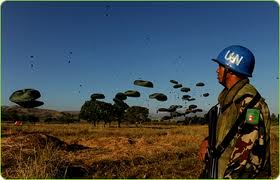 Results from the latest Haitian-cholera study by the Center for Disease Control (CDC) sparked an avalanche of blame and finger pointing across the country, demanding accountability and the redressing of grievances. “Today it is clear, about 5,000 people have died and there is one group of people responsible: it is MINUSTAH,” said Steven Benoit, outspoken senator from the West Department. “It is the Nepalese military contingent of MINUSTAH, still in Mirebalais even today,” he emphasized.
Results from the latest Haitian-cholera study by the Center for Disease Control (CDC) sparked an avalanche of blame and finger pointing across the country, demanding accountability and the redressing of grievances. “Today it is clear, about 5,000 people have died and there is one group of people responsible: it is MINUSTAH,” said Steven Benoit, outspoken senator from the West Department. “It is the Nepalese military contingent of MINUSTAH, still in Mirebalais even today,” he emphasized.
All indexes pointed to the U.N. stabilization forces currently in Haiti that, according to a study by a team of epidemiologists and physicians, imported a fatal cholera strain that destroyed thousands of lives, infecting hundreds of thousands of Haitians. “Evidence strongly suggests that a United Nations Peacekeeping mission introduced the strain to Haitians,” the team inferred, adding the report provided “circumstantial evidence that fecal contamination of a local stream draining into the Artibonite River initiated the epidemic.”
The news came as no surprise to national leaders: political, civil or otherwise who amplified their voices of discontent with MINUSTAHs persisting denial. “We demand relief and reparations, proclaimed Carole Pierre-Paul Jacob of the Organization for the Solidarity of Women (SOFA). “And in terms of relief and reparations,” she added, “we demand that MINUSTAH recognizes that this is a crime that is political, against human rights and against a nation.”
Published in the July issue of Emerging Infectious Diseases, the study presented a compelling case, the strongest yet, that the South Asian strain originated with newly arrived Nepalese peacekeepers stationed near the town of Mirebalais. Haitian government figures indicated the disease killed more than 5,500 people and sickened more than 363,000 others since discovered in October 2010. “Our findings strongly suggest that contamination of the Artibonite and one of its tributaries downstream from a military camp triggered the epidemic,” insisted the report in the CDC journal.
For Haitians, this study shattered the UN’s “confluence of circumstances” theory: the basis for its denial of responsibility. Identifying a South Asian strain placed Nepalese forces that experienced a cholera outbreak during the summer before the Haitian earthquake at the origin of Haiti’s cholera epidemic, reasoned observers.
The report was specifically the kind of scientific-based investigation U.N. Secretary General Ban Ki-moon requested when he faced growing pressure from anti-U.N. Haitian protests and mounting circumstantial evidence in December, condemning his troops as sole culprits responsible for the outbreak. However, in the released statement, the U.N. failed short of accepting responsibility for the fatal epidemic. “The Secretary-General reaffirms the continuing commitment of the United Nations to stand shoulder to shoulder with the Government and people of Haiti in the ongoing fight against the cholera epidemic and expresses his gratitude to the many countries and organizations that have helped to combat the disease,” the statement read.
“However it occurred,” wrote authors Scott Dowell, director of the CDC’s Division of Global Disease Detection and Emergency Response, and Christopher Braden, a medical epidemiologist with the CDC, “there is little doubt that the organism was introduced to Haiti by a traveler from abroad, and this fact raises important public health considerations.”
Senator Benoit went even further, demanding that Head of State Michel Martelly addressed the issue. “Today,” he said in the televised interview, “the government must say something, not only about the contingent in Mirebalais, superiors and soldiers, but also about the victims and their families.” Echoing the senator, Jacob added, “They owe these people a public explanation and apology.”